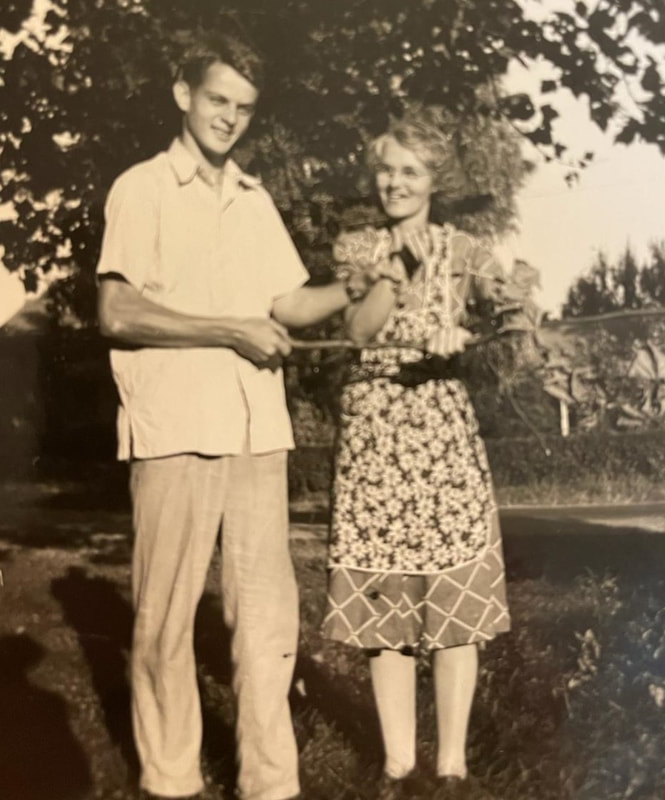
A little about the role of the 352nd before I finish up with Carlton’s story….The 352nd from Wikipedia, “flew bomber escort missions, counter-air patrols, attacks on airfields, trains, vehicles, troops, gun positions and other targets.” They escorted bombers during an engagement called Operation Argument in February 19-25nd of 1944 lasting 7 days, also called “The Big Week”. This operation, aided by the 9th Air Force conducted a series of air raids to weaken the forces of the German Luftwaffe while also providing escort for bombing operations using the P-51 Mustangs. The strikes were conducted at Posen, Poland and Stuttgart, Germany taking out aircraft factories and facilities, and was very successful in decimating German air power. On May 8th, 1944 a Distinguished Service Citation was awarded the unit due to the success of an escort mission to Brunswick, Germany where the unit fought off an attack by a “numerically superior” group of German fighter jets. The 8th was present during the invasion of Normandy in June 1944, and later that year the Battle of the Bulge. The 8th at the time took up residence at Asch Airfield in Belgium joining with the 9th Air Force in what was called Operation Bodenplatte. German fighters were attempting to cripple the American forces, but word reached a commanding officer of the intended raid. The American planes took off, avoiding the ambush and 12 fighters fought 50 German fighters – the American fighters all survived, but 25 German planes did not.
Still in Belgium in February of 1945, the 352nd moved in to join the 361st Fighter Group as the first fighter groups to take up residence on the European continent. The two groups provided support for Operation Varsity, which was an airborne assault across the Rhine on March 2nd of 1945, an engagement involving 16,000 paratroopers and thousands of planes. As operations go, it was the largest to take place in WW2 in a one day period.
April of 1945 had the 352nd back at Bodney, where they remained until VE Day on May 8th. The war ended in Europe as Germany capitulated and the unit prepared to return to the states. The unit ended up back in New Jersey at Camp Kilmer in November of 1945, though Carlton was discharged from Tuscon. According to his daughter Sandra Bowling, he was probably the youngest man on his radar crew and most of the other men he worked with were college graduates. Carlton appeared to be influenced and inspired by these men and their accomplishments. A bright young man, he came home to Kentucky and decided to take advantage of the GI bill allowing him to attend college, graduating from the University of Kentucky with a degree in electrical engineering in 1949. Carlton married, had and raised children and retired from a job with Bell South in Owensboro, Kentucky in 1987. Years later he would join his daughter Sandra and husband Ed to live in Indiana.
Carlton, like his brother also had some persons of distinction serving with the Mighty 8th for a period of months. Lt. General James Doolittle of the Doolittle Raiders fame was appointed their commanding officer from January 6th, 1944 through May of 1945, having moved from his command of the 15th Air Force. Under Doolittle’s command the 8th came in as air support for the Battle of the Bulge in December of 1944 till February 1945, sending 16,312 bombers on raids. Doolittle was instrumental in designing the policy assigning escort fighter planes to accompany and protect the bombers at all times. From his autobiography, I Could Never Be So Lucky Again, Doolittle quotes his friend General George Patton giving him props saying, “I really was awfully pleased and want to compliment you on the fine spirit of the men of your command, and also to thank you for the great help you and all the other air people have been to this Army.”
The son of the President, Elliot Roosevelt was a distinguished pilot with the 8th. Elliot was pulled from air duty due to Doolittle’s fear of the President losing another son. He lost his son Teddy, Jr. to a heart attack in July 1944 while on duty in Paris shortly after the D-Day invasion. Actor Jimmy Stewart took time off his career in Hollywood to serve as a fighter pilot, flying B-24s and according to the website Military.com, he eventually ended up as “Chief of Staff of the 2nd Combat Wing, 2nd Air Division of the 8th Air Force”. Surrounded by these persons of distinction who felt compelled to serve when they probably could have had an out surely helped the morale of this unit, who took so many losses. In the end, Doolittle summed up the work of the 8th saying, “I had our statisticians compile what the 8th had done in three years of war, and the figures are impressive: 701,300 tons of bombs dropped, including 531,771 tons on Germany; 18,512 enemy aircraft destroyed. On the other side of the ledger, we listed 43,742 American fighter pilots and bomber crewmen as killed or missing in action. We lost 4,456 bombers in combat.”
Carlton’s daughter Sandra expressed that her Dad felt a sense of survivors guilt, working on the plane’s radar, sending the men and their aircraft off never to see some of them ever again. I’m glad for his family’s sake he was ground crew and made it home. He died in Indianapolis on July 28, 2017 at the age of 92 and is buried in Lexington, Kentucky, his home town.
-Tammi
Update 7/9/2021: Evidently Carlton got to work on the B-29 Superfortress. According to his daughter Sandy Bowling:
"Dad didn’t do radar on 51 Mustangs. He checked radios and did radar on B 29’s. I know that because he talked doubt that occasionally and we took him to the Wright Patterson Air Force museum to see the B 29 there. He told us the inside of that one was arranged a little different, but he showed us how they got into the plane from the rear. He also told us they used to put aluminum foil in the planes to mess up the enemy’s radar."




 RSS Feed
RSS Feed